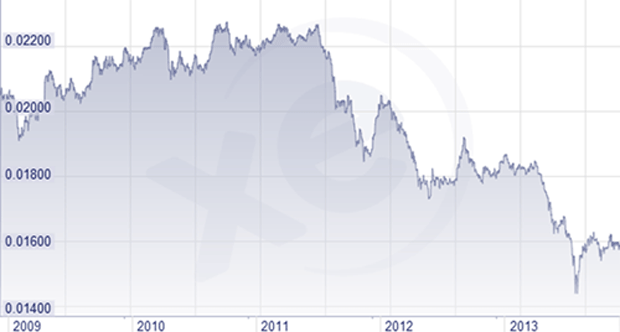When paper gold is not enough
Simon Popple explains why demand for gold is proving resilient in India, and what that means for your investments.
Get the latest financial news, insights and expert analysis from our award-winning MoneyWeek team, to help you understand what really matters when it comes to your finances.
You are now subscribed
Your newsletter sign-up was successful
Want to add more newsletters?

Twice daily
MoneyWeek
Get the latest financial news, insights and expert analysis from our award-winning MoneyWeek team, to help you understand what really matters when it comes to your finances.

Four times a week
Look After My Bills
Sign up to our free money-saving newsletter, filled with the latest news and expert advice to help you find the best tips and deals for managing your bills. Start saving today!
I talk a lot about "strong demand for gold". It's a crucial part of my investment case for investing in miners. For example, I recently covered research from Sprott Asset Management which shows that gold demand is hugely understated by the official figures.
In an open letter to the World Gold Council, Sprott said, "demand statistics reported by the World Gold Council (WGC) consistently misrepresent reality, mostly with regard to demand from Asia".
So what does this "demand from Asia" look like? Who's buying all this gold?
MoneyWeek
Subscribe to MoneyWeek today and get your first six magazine issues absolutely FREE

Sign up to Money Morning
Don't miss the latest investment and personal finances news, market analysis, plus money-saving tips with our free twice-daily newsletter
Don't miss the latest investment and personal finances news, market analysis, plus money-saving tips with our free twice-daily newsletter
Well, India is the world's second largest consumer of gold. Today I want to show you what's happening there. And what it means for your investments.
As I'm sure you're aware, gold is held in very high regard throughout India. Like here, gold is an important asset class. But it goes deeper than that. Gold is an important part of Indian culture. It's used a lot in weddings and other ceremonies.
Gold and the Indian economy
In fact, demand is so strong that gold imports have been blamed for India's huge current account deficit. A current account deficit is created when a country imports more than it exports. That puts downward pressure on the value of its currency. And a weak currency hits consumers with inflation and more expensive imports.
Indian rupee / US dollar exchange rate

Source:www.xe.com
Indian gold imports accounted for a staggering $56.8bn of their $88bn current account deficit in 2013. That made gold a natural target for the government. They gave gold both barrels, imposing a highly punitive import duty. The duty on gold jewellery has now risen from 2% in January 2012 to the current level of 15%.
Has this quashed demand? Absolutely not. Indians only want the physical metal and are prepared to pay over the odds for it, even if it results in smuggling which is now reaching epidemic proportions.
"Haresh Soni, Chairman of the All India Gems and Jewellery Trade Federation, which represents over 300,000 jewellers in the country, said that there was a pressing need to relax the curbs as the industry had witnessed a massive spurt in gold smuggling. He added that the industry had lost over 30% business in the last six months."
The combination of this punitive tax and smuggling has resulted in Indians paying over a 20% premiumabove the increasingly irrelevant paper price to get their hands on the real thing.

Source:www.goldchartsrus.com
It's a great example of what happens when paper gold is not enough and the general public the 'retail' market start clamouring for it. When the rest of the 'retail world' starts waking up to the importance of gold then this premium could move dramatically. And that would further undermine the paper market.
This article was first published on 20/10/2013 in the Metals and Miners newsletter.
Metals and Miners is a regulated product issued by Fleet Street Publications Ltd. Your capital is at risk when you invest in shares, never risk more than you can afford to lose. Please seek independent financial advice if necessary. Customer services: 0207 633 3600.
Get the latest financial news, insights and expert analysis from our award-winning MoneyWeek team, to help you understand what really matters when it comes to your finances.
Simon is an expert in investing in gold and commodities which he shares for our MoneyWeek readers. He studied at the University of Surrey where he achieved a business degree and a marketing diploma. After taking his studies further and doing an MBA at Birmingham University, Simon was the first MBA student offered an internship in the U.S. Since then, Simon has been a part of the Senior Banker team at ABN Amro where he became the founding member of their Financial Sponsors team, and then joined Strutt and Parker Financial Services where he was appointed as Head of Investment Management. He also became a director at one of the world’s biggest private property companies, Topland. Simon Popple has written for MoneyWeek and Agora Financial.
-
 Should you buy an active ETF?
Should you buy an active ETF?ETFs are often mischaracterised as passive products, but they can be a convenient way to add active management to your portfolio
-
 Power up your pension before 5 April – easy ways to save before the tax year end
Power up your pension before 5 April – easy ways to save before the tax year endWith the end of the tax year looming, pension savers currently have a window to review and maximise what’s going into their retirement funds – we look at how